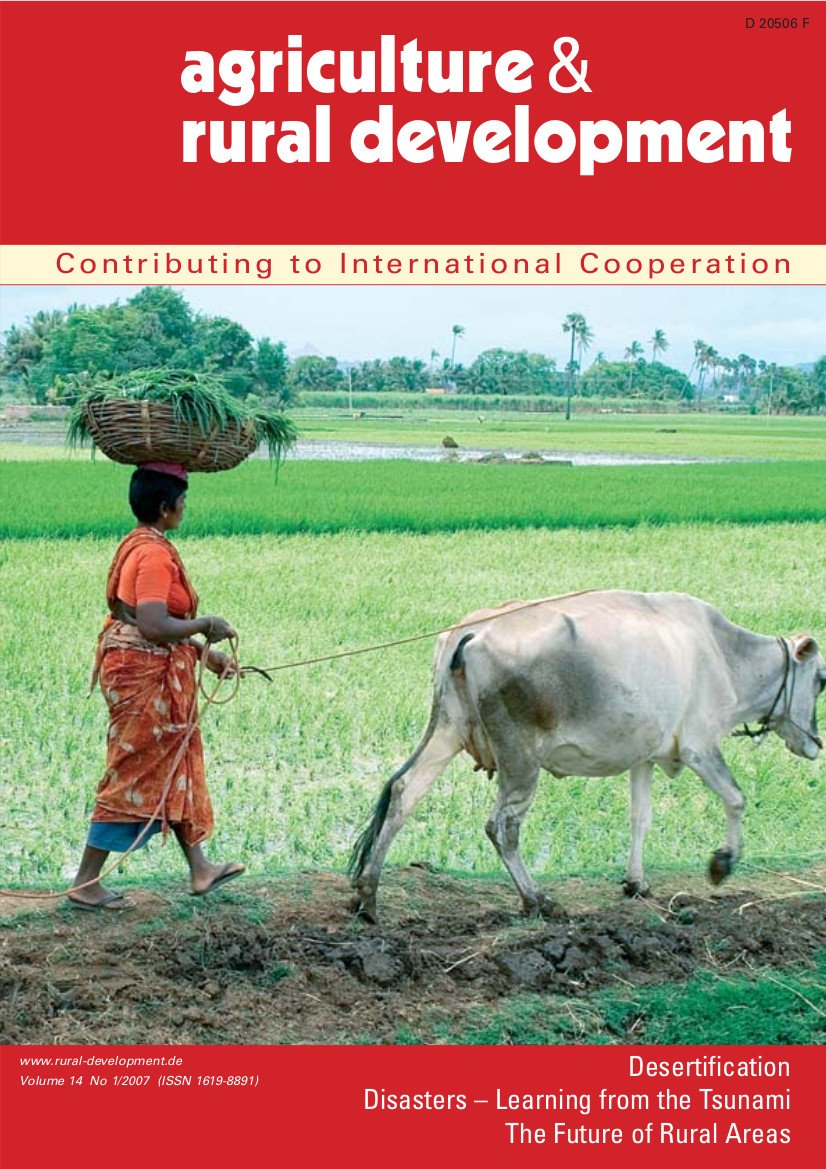Location
The international journal Rural 21 has dedicated more than 40 years to all topics surrounding rural development. Its ambition is to further those strategies and policies that strengthen rural areas of developing and newly industrialising countries and encourage their implementation. The journal addresses the complete range of relevant themes – from agriculture and fisheries via capacity building and education through to health and social security, energy supply and trade. Center-stage is always devoted to inquiring into how measures and strategies can contribute to global food security and to reducing poverty.
Rural 21 desires to further the dialogue between science and politics, the private sector, civil society and practitioners. Two platforms are designed for this purpose: Rural 21 in print is published four times a year, each issue highlighting a specific focus of rural development – this print edition is read in more than 150 countries. In parallel, Rural 21 online keeps the rural development community up to date on news and events, scientific findings and other print and online publications.
Rural 21 is published by DLG-Verlag GmbH in Frankfurt/Germany. Financial partners are BMZ (German Federal Ministry for Economic Cooperation and Development), GIZ (Deutsche Gesellschaft für Internationale Zusammenarbeit), DLG (German Agricultural Society – Deutsche Landwirtschaft-Gesellschaft), SDC (Swiss Agency for Development and Cooperation) and Helvetas Swiss Intercooperation.
The first issue of Rural 21 dates back to 1968. From 1974 to 2007, the journal was published in three languages entitled "entwicklung & ländlicher raum" / "agriculture & rural development" / "agriculture & développement rural". In 2008, the journal was relaunched as "Rural 21".
Members:
Resources
Displaying 291 - 295 of 319External action to overcome fragile structures: What can development policy achieve?
Development policy has to deal with the full spectrum of fragility in developing countries, which can range from individual deficits, for example in guaranteeing security, to the total collapse of state structures.The scope available to development policy and other external actors is always limited. Nevertheless, starting points are often on hand to achieve some measure of stability and help overcome weak state structures.
Information and Communication Technologies ICTs: Giving ACP youth a voice.
For the first time in the recent history of rural development there is a possibility of creating an infrastructure that dramatically reduces the isolation of rural life. Although ICTs may seem a fragile basis on which to build far-reaching change, a meeting organized by CTA showed that they can speed up the exchange of knowledge and ideas between urban centres and rural communities. In countries struggling to maintain basic amenities, it is the towns that interface most closely with global society.
Implementing the Voluntary Guidelines: challenges and options
Following unanimous approval of the Voluntary Guidelines (VGs) on the Right to Adequate Food by FAO member states, with civil society's broad support, the question of «next steps» arises. To explore how to put this important new tool to use, the German government, with support from FAO and German NGOs, organized its fourth International Workshop on «Policies Against Hunger», held in June 2005 in Berlin.
Regional aspects - Desertification in the Middle East and North Africa. Warning signs for a global future?
Desertification is nowhere more serious than in the Middle East and North Africa (MENA), stretching from Pakistan in the east to Morocco in the west, and from Ethiopia and Sudan in the south to Turkey in the north. Yet, many MENA countries have successfully rehabilitated large areas. Concerted efforts can indeed stop and even reverse desertification, though their long-term success will depend on how well they manage their limited water resources.
The outlook for the UNCCD - German Development Cooperation's viewpoint. The Convention to Combat Desertification: Relevant or a relict?
In the ten years since it came into being, the United Nations Convention to Combat Desertification (UNCCD) has had little or no effect on the further encroachment of deserts. More than 80 countries have submitted National Action Programmes to combat desertification, but they appear to lack the financial and political commitment to implement them. What are the causes behind the UNCCD's weakness? How can the Convention be incorporated more effectively and efficiently into the architecture of international development?



